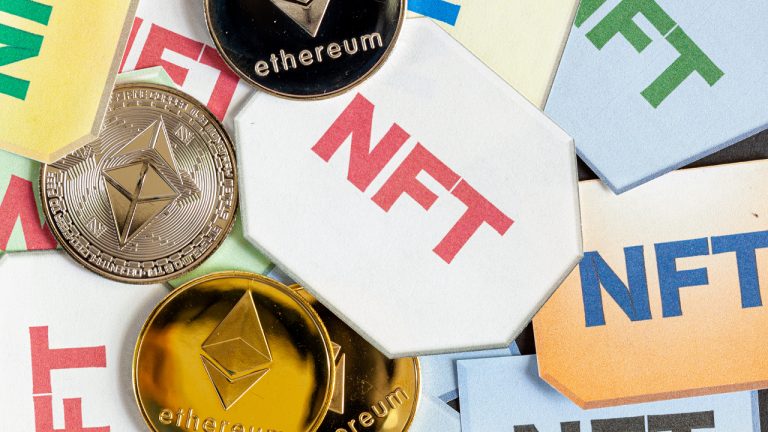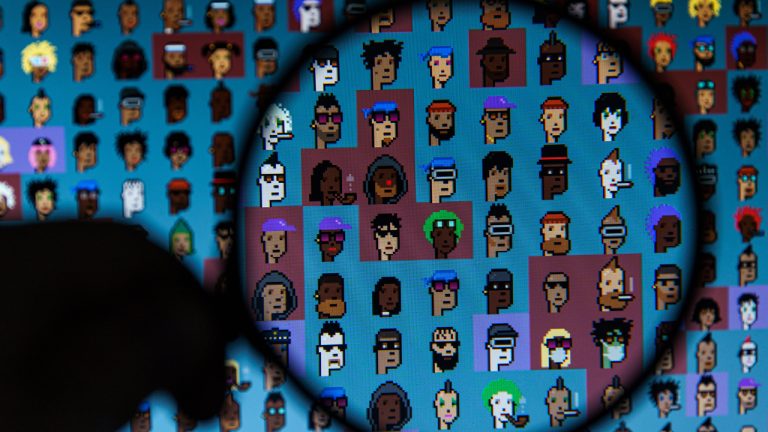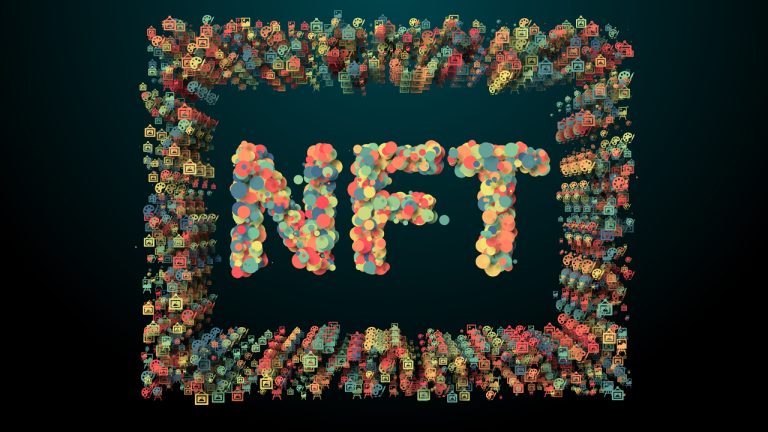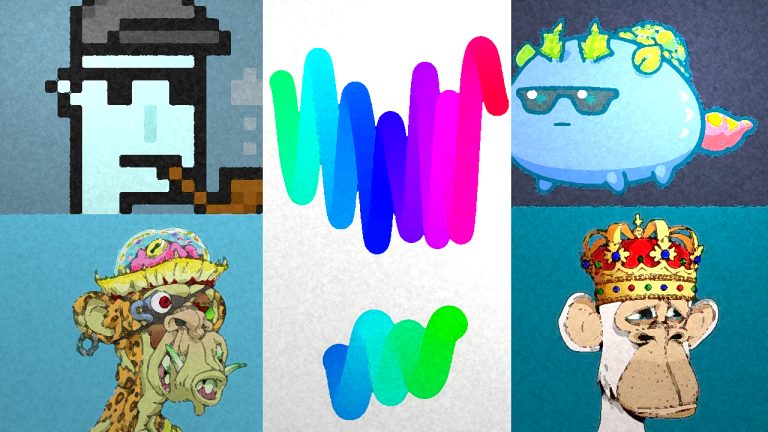 Sales of non-fungible token (NFT) assets over the last seven days rose 43.97% compared to the previous week, according to statistics recorded on Feb. 18, 2023. The volume of NFT sales reached $397.86 million this week, with 345,716 NFT buyers and roughly 1.62 million transactions. NFT Sales Continue to Rise in 2023, Ethereum Dominates NFT […]
Sales of non-fungible token (NFT) assets over the last seven days rose 43.97% compared to the previous week, according to statistics recorded on Feb. 18, 2023. The volume of NFT sales reached $397.86 million this week, with 345,716 NFT buyers and roughly 1.62 million transactions. NFT Sales Continue to Rise in 2023, Ethereum Dominates NFT […]
The Ordinals hype is real with the NFT inscriptions now regularly taking over 50% of Bitcoin block space.
Bitcoin (BTC) miners have earned nearly $600,000 in two months from a new controversial NFT protocol called Ordinals that has triggered a surge in user activity.
Ordinals allow users to inscribe data in the form of images and other media types in newly mined blocks on the Bitcoin blockchain that's otherwise largely used for peer-to-peer monetary transactions.

Since the launch of Ordinals in mid-December, however, users have inscribed nearly 74,000 NFTs into the Bitcoin blockchain, earning miners a cumulative $574,000 in BTC transaction fees to date, data from Dune Analytics shows.
These NFTs include "digital artifacts" stemming from the derivative projects of Ethereum's CryptoPunks and Bored Ape Yacht Club collection in February.
The NFT community is moving to BTC, where Ordinals have brought true scarcity to collectibles.
— Jason A. Williams (@GoingParabolic) February 12, 2023
I forever inscribed “The Blonde Don” BAYC #1626 on the world's scarcest and most secure chain burning him off ETH forever using TeleBurn.
It's done. Over. Not coming back to ETH. pic.twitter.com/jmKpSSPybm
The Ordinals protocol was made possible by Segregated Witness (SegWit) and Taproot, Bitcoin's network soft fork upgrades from 2017 and 2021, respectively.
Related: Ordinals protocol sparks debate over the place for NFTs in the Bitcoin ecosystem
For instance, the SegWit update effectively increased Bitcoin's block capacity up to 4MB.
Similarly, the Taproot update helps batch and verify multiple transactions together as long as their size does not exceed 4 MB. This feature allows the inscription of data such as images and videos in Bitcoin blocks.

The advent of Ordinals has coincided with Bitcoin's mean block size jumping from its typical average of 1.5-2MB to between 3 and 3.5MB in early February.

Simultaneously, the number of pending SegWit and non-SegWit blocks in the Bitcoin mempool has also increased significantly — the highest since the FTX collapse, as shown below.

On some occasions, Ordinals' data has been comprising over 50% of Bitcoin block space, according to BitMEX Research.
"This describes a growth in the user base and an upwards pressure on the fee market from usage beyond the typical investment and monetary transfer use cases," noted Glassnode in its weekly report, adding:
"Ordinals are a new frontier [...] to observe how it affects and manifests in both on-chain network and investor behavior."
Bitcoin miners generate most of their revenue from the network's block subsidies, i.e. finding or "mining" new blocks. By comparison, the share of miner's earnings from transaction fees is only about 3%.
Currently, the Bitcoin network rewards miners with 6.25 BTC per block. But this subsidy will drop by 50% to 3.125 BTC by spring 2024 in an event called halving that happens every four years. As a result, the share of miners' revenue from transaction fees is expected to rise over time as block rewards decrease.
To some, Ordinals introduce what's called miner extractable value, or MEV, which has been previously associated with mining on Ethereum.
Simply put, MEV is the maximum value that miners can obtain from producing new blocks beyond the block rewards and transaction fees.
If Bitcoin Ordinals will take off (and I think it will) it’s really good news for Bitcoin mining companies’ revenue, something that’s not reflected in their valuations yet.
— Marc van der Chijs (@marcvanderchijs) February 6, 2023
Critics, however, argue that Ordinals as an "attack" that will price out real financial activity and thus damage Bitcoin's image as a reliable P2P payments network.
"Bitcoin is designed to be censor resistant," said Adam Back, co-founder and CEO of Blockstream, adding:
"[It] doesn't stop us mildly commenting on the sheer waste and stupidity of an encoding. At least do something efficient. Otherwise, it's another proof of consumption of block-space thingy."
This article does not contain investment advice or recommendations. Every investment and trading move involves risk, and readers should conduct their own research when making a decision.
 Non-fungible token (NFT) sales rose 18.43% this week, totaling $272.68 million. However, the number of NFT buyers declined by 60.31% to approximately 195,716. Ethereum NFT sales continue to lead the market, accounting for $233.85 million of the total sales, a 25.42% increase from the previous week. Top NFT Collection of the Week: Otherdeed Leads with […]
Non-fungible token (NFT) sales rose 18.43% this week, totaling $272.68 million. However, the number of NFT buyers declined by 60.31% to approximately 195,716. Ethereum NFT sales continue to lead the market, accounting for $233.85 million of the total sales, a 25.42% increase from the previous week. Top NFT Collection of the Week: Otherdeed Leads with […]
A Yuga Labs spokesperson has played down the significance of the opposition notice and suggested that the RR/BAYC co-founder is just trying to cause trouble.
One of the founders of the Bored Ape Yacht Club copycat NFT collection RR/BAYC has filed an opposition notice against 10 trademark applications from Yuga Labs.
The move marks another strange twist in the ongoing intellectual property dispute between BAYC creators Yuga Labs and RR/BAYC founders Ryder Ripps and Jeremy Cahen.
Cahen filed the opposition notice to the US Patent and Trademark Office’s (USPTO’s) Trademark Trial and Appeal Board on Feb. 9. The opposition status on all of the trademark filings currently read “pending” at the time of writing.
Yuga Labs’ trademark applications were mostly submitted in the latter half of 2021, and cover a bunch of BAYC logos, artwork and branding for potential use across digital products such as NFT-based art, trading cards and Metaverse wearables.
The filings also list the potential for physical BAYC products including clothing, jewelry, watches and keychains, along with entertainment services such as gaming, television and music.

Speaking with Bloomberg Law on Feb. 11, a Yuga Labs spokesperson played down the chances of Cahen’s opposition being successful and suggested that the move was just another attempt to cause trouble for the firm.
“The Trademark Office has preliminarily approved Yuga Labs’ trademark applications for registration, and we look forward to their full approval in due course,” they said, adding that:
“Jeremy Cahen’s filing is just another attempt to distract from the real issue at hand, his infringement of the Yuga intellectual property.”
In the notice, Cahen puts forward a lengthy list of “grounds for opposition” against Yuga Labs’ filings. In particular, Cahen claims that the company “abandoned any rights” to certain logo and artwork designs due to BAYC NFT sales granting “all rights” of the digital images to the owners.
He also claims that Yuga Labs is not the rightful owner of specific skull designs due to the firm supposedly handing over the rights to the ApeCoin decentralized autonomous organization (DAO) back in March 2022.
Additionally, Cahen argues that Yuga Labs failed to provide a “bona fide intent to lawfully use” the trademarks in its filings as the NFTs should be registered and classified as securities under federal law.
Related: Nifty News: Find love in Paris Hilton’s metaverse, BTC CryptoPunks soar and more
BAYC creators Yuga Labs sued digital artist Ryder Ripps and Cahen back in June for using BAYC imagery in the RR/BAYC collection. The firm also alleged that the duo were intentionally “trolling Yuga Labs and scamming consumers” into purchasing their copycat NFTs.
The move from Cahen also comes just three days after Yuga Labs settled a separate lawsuit against RR/BAYC website and smart contract developer Thomas Lehman.
As part of the settlement, Lehman essentially agreed to a permanent injunction barring him from partaking in any “confusingly similar” BAYC-related projects. In a statement, Lehman also distanced himself from Ryder Ripp and Cahen.
 Non-fungible token (NFT) sales rose slightly last week, increasing 1.23% to $232.49 million in recorded sales. The top two NFT collections, Otherdeed and Doodles, saw growth of 44% to 58% compared to the previous week. Ethereum continues to dominate the NFT industry, accounting for more than 81% of total sales last week with $188.51 million […]
Non-fungible token (NFT) sales rose slightly last week, increasing 1.23% to $232.49 million in recorded sales. The top two NFT collections, Otherdeed and Doodles, saw growth of 44% to 58% compared to the previous week. Ethereum continues to dominate the NFT industry, accounting for more than 81% of total sales last week with $188.51 million […]
The seized property included a Bored Ape Yacht Club and Doodles NFT, 85.6 Ether and a flashy Audemars Piguet watch which ultimately helped ZachXBT identify the alleged scammer.
The Federal Bureau of Investigation (FBI) has seized two non-fungible tokens (NFTs) worth more than $100,000 and 86.5 Ether (ETH) from a reported phishing scammer.
The alleged scammer in question, Chase Senecal — known as Horror (HZ) online — was initially exposed via a lengthy investigation by independent blockchain sleuth ZachXBT posted back in September.
In the FBI’s official notification posted on Feb. 3, it outlined that Seneca’s property — which also included an Audemars Piguet (AP) Royal Oak Watch worth $41,000 — was “seized for federal forfeiture for violation of federal law.”
The FBI’s notification did not detail much other information on the ordeal apart from noting that all of the property was seized on Oct. 24. The specific NFTs include Bored Ape Yacht Club#9658, and Doodle #3114 and were valued at $95,495 and $9,361 at the time of seizure.
The 86.5 ETH was valued at $116,433 at the time of seizure, but is now worth $144,000 at the time of writing.
It is unclear what the full scope of legal proceedings that have taken place against Senecal are at this stage. However, according to the FBI’s law enforcement bulletin, federal forfeiture is a law enforcement tool that enables the government to “remove—without compensation for the individual—ownership of property involved in a crime.”
“It may occur in a civil procedure, like a lawsuit against the item, or after the conviction of an individual in a criminal trial,” the FBI states.
While the FBI has not come out with an official tip of the hat to ZachXBT, the on-chain sleuth noted via Twitter on Feb. 3 that the property seizure did “come as a result” of his investigation.
2/ HZ was responsible for using a Twitter panel to take over accounts like @Zeneca @nounsdao @ezu_xyz @deekaymotion @JRNYclub as well as Discord server attacks @AnataNFT @Lacoste
— ZachXBT (@zachxbt) February 3, 2023
The thread which started it all I’ve attached below. https://t.co/6dsfZ5jnGl pic.twitter.com/8EYl1yuIik
“I look forward to hopefully seeing more phishing scammers suffer a similar fate in the future for harming so many people in this space,” ZachXBT wrote.
With the seizure of a Bored Ape NFT, people in the community have joked that the FBI will change its profile picture to Ape #9658.

Notably, the flashy AP watch was one of the key identifiers that helped ZachXBT unmask Senecal’s identity and on-chain activity during the investigation.
In a medium post from Sept. 2, ZachXBT explained that after seeing Horroz (HZ) brag about the new watch on social media, he asked “around a few mutual friends who sell watches” and eventually managed to get in contact with the person who sold that specific AP watch to Senecal.
Unfortunately for Senecal, the payment was said to have been made on the blockchain via the use of USD Coin (USDC).
“The address HZ used to pay the watch seller $47.5k was DIRECTLY funded by multiple addresses used to scam people with hacked Twitter accounts such as @deekaymotion, @Zeneca_33, @ezu_xyz, [and] @JRNYclub,” ZachXBT wrote.
This is not the first time ZachXBT’s research has played a key role in helping government authorities. In October, France’s national cyber unit cited ZachXBT’s work in helping it catch and charge a group of alleged fraudsters on suspicion of stealing $2.5 million worth of NFTs via phishing scams.
 Non-fungible token (NFT) sales increased 41.96% from the previous month, according to data recorded on Feb. 1, 2023. NFT sales reached nearly $1 billion in 30 days, with an approximate total of $997.53 million. Additionally, the number of digital collectible transactions rose more than 22% in the past month. Bored Ape Yacht Club Dominates, Ethereum […]
Non-fungible token (NFT) sales increased 41.96% from the previous month, according to data recorded on Feb. 1, 2023. NFT sales reached nearly $1 billion in 30 days, with an approximate total of $997.53 million. Additionally, the number of digital collectible transactions rose more than 22% in the past month. Bored Ape Yacht Club Dominates, Ethereum […]
It isn’t clear whether a 25-year-old European Union law means you should be allowed to get refunds on your NFTs.
Should people who purchase nonfungible tokens (NFT) be entitled to refunds if they decide they don’t like their digital pictures? Some Europeans are beginning to make that case under a 25-year-old law.
Unhappy buyers have claimed that their right to a refund is protected by a 1997 European Union law that requires any person or business engaged in “distance selling” — that is, buying and selling a product that is not done in person — to allow customers a 14-day grace period to return the product for a refund. But since digital goods are different, the law makes provision for the 14-day period to be waived if customers are made aware in advance.
While the interpretation of the law is going to inevitably play out in the courts, there are several important caveats to take into account, particularly given that the law was written before the ubiquity of digital goods and services. Simply put, the law was written before the emergence of the internet, let alone digital assets like NFTs, so it is much less applicable today.
I decided to e-mail @yugalabs and ask them for a refund on my Otherdeed NFT, which I believe is my statutory right under UK law.
— Paul | Top Dog Studios (@darkp0rt) January 26, 2023
They replied!
And of course, I asked ChatGPT to write the e-mail for me https://t.co/7jIYLZyZaK pic.twitter.com/DJfYQqT3xk
Just as an example that it is not applicable to the current state of the NFT market, consider that “this Directive shall not apply to contracts” that are “concluded with telecommunications operators through the use of public payphones.” What differentiates contracts that are concluded through the use of public telephones versus through the blockchain? Nothing substantive other than the delivery mechanism, underscoring that the intent of the law was to prevent consumers from getting ripped off by sellers who were shipping physical goods that turned out to be different from what the consumer originally desired before seeing it in person.
Fundamentally, applying the directive to NFTs would pose grave consequences for patent and trademark law. Crucially, each NFT is, by definition, inherently unique, and any NFTs that get refunded and discarded inevitably imply the destruction of intangible capital. By contrast with the 1997 EU directive, shipped products are largely homogeneous, so a buyer who seeks a refund and returns it does not damage the product and prevent the seller from reselling it.
Seeing a lot of chatter about NFT refunds lately. I think this would ruin the NFT experience if it passed
— Psycho (@AltcoinPsycho) January 26, 2023
People will just mass-mint projects & seek a refund if they don’t get a rare NFT
Terrible idea. Imagine if Yugioh cards were refundable after opening https://t.co/cwx5ehiZzv
Furthermore, allowing for refunds would eliminate the very purpose of rarity in profile picture projects — potentially eliminating their value altogether. Consider the example of Bored Ape Yacht Club NFTs. The highest-value BAYC purchase was for $3.4 million spent on #8817 — which was minted for roughly $1,000 in April 2021. Its rarity is partially a product of its “gold fur,” a trait held by less than 1% of BAYC NFTs on the market.
Of course, if buyers can simply request a refund in the event that they do not like the NFTs they randomly receive during the minting process, it’s safe to say that such “1% NFTs” will become much more common, as buyers will simply keep seeking refunds until they obtain the NFTs they want. If you follow the logical consequences of that thinking, there will no longer be rare NFTs in any corner of the market.
The reality is that the law around digital assets has not kept up with the technology, so there is naturally a temptation to rely on outdated, irrelevant regulatory guidance, for better or worse. But if we keep pressing on and companies innovate and serve consumers in good faith, we can converge to a new equilibrium that generates value on all sides of the equation.
This article is for general information purposes and is not intended to be and should not be taken as legal or investment advice. The views, thoughts and opinions expressed here are the author’s alone and do not necessarily reflect or represent the views and opinions of Cointelegraph.
 Non-fungible token (NFT) assets have existed since at least 2014, but interest in them began to rise in January 2021, according to Google Trends data. Approximately one year later, the search term “NFT” reached its highest score on Google Trends. During that time the top five NFT collections, in terms of all-time sales volume, have […]
Non-fungible token (NFT) assets have existed since at least 2014, but interest in them began to rise in January 2021, according to Google Trends data. Approximately one year later, the search term “NFT” reached its highest score on Google Trends. During that time the top five NFT collections, in terms of all-time sales volume, have […]
Aronow said he will still be contributing as a board member and strategic advisor. However, his priority will be to get the best medical treatment he can to make a full recovery.
Nonfungible token (NFT) entrepreneur Wylie Aronow of Yuga Labs — the team behind Bored Ape Yacht Club (BAYC) and CryptoPunks — will be taking a leave of absence from the office to manage a host of heart failure symptoms.
In a Jan. 28 Twitter post to his 144,900 followers, Aronow said the tough decision to step away came on the back of a heart failure diagnosis after experiencing a myriad of symptoms over the last few months.
Some heavy news: a few days ago I was told by my doctor I have congestive heart failure. Symptoms started last year out of the blue and I put off seeking help (like an idiot) so I could keep working. But after testing, my doctor called and asked me to radically change my life.
— GordonGoner.eth (Wylie Aronow) (@GordonGoner) January 28, 2023
The NFT entrepreneur explained that while his "mild" symptoms still enable him to live a “mostly normal life,” his condition has rapidly accelerated to the point where he had no other option but to deprioritize his work.
The Yuga Labs co-founder didn’t put a date on when he would hope to make a full recovery and return to day-to-day duties.
However, Aranow confirmed that he will be sticking around as a board member and strategic advisor.
This isn’t the first medical diagnosis that has kept Aranow out of work either.
Aranow revealed that he dealt with a chronic illness in his twenties which held him back from progressing in his career. So when he finally recovered and co-founded Yuga Labs, there was no looking back:
“When I recovered and we started Yuga, I didn’t want to waste a second chance at life. I pushed myself way past my limits. I worked 12 hours a day, nearly every day. I should have taken the advice from everyone around me and sought balance.”
“My goals now are to get the best medical treatment I can and heal,” he added.
Related: BuzzFeed backlash after ‘doxxing’ of Bored Ape Yacht Club founders
Aronow also expressed his excitement to soon work alongside the firm’s new CEO, Daniel Alegre, the former president and chief operating officer of Activision Blizzard.
While Aronow did not provide any detail on what he would be doing as strategic advisor, Aronow recently announced on Nov. 8 that he would propose a new model for NFT creator royalties.
Aronow co-founded Yuga Labs alongside Greg Solano in February 2021.
Among the most notable NFTs developed by the company are CryptoPunks, BAYC, MeeBits and Othersidemeta.